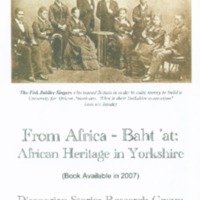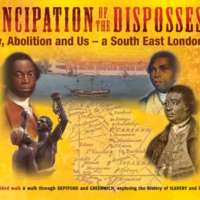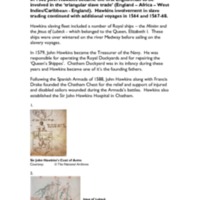
From Africa - Baht 'at: African Heritage in Yorkshire
The Diasporian Stories Research Group includes writers, historians, educators and performing artists working to uncover Black history associated with Yorkshire. To mark the bicentenary, the group published its first book 'From Africa Baht 'at', exploring links between Yorkshire and the Atlantic trading world. This included influential Black men and women who lived in or visited Yorkshire, and the shipbuilding industry of the Yorkshire coast that supplied ships for slaving voyages. The Fisk Jubilee Singers toured Britain in order to raise money to build a University for African-Americans. One of the singers settled in Yorkshire.

Emancipation of the Dispossessed: Slavery, Abolition and Us - a South East London angle
Emancipation of the Dispossessed was a local community project exploring the local history of Deptford and the surrounding areas and the connections with the transatlantic slave trade. Community groups and students from Lewisham College worked with theatre educators to research and develop 'Blood Sugar', a promenade performance through the Queen's House, Greenwich. The play, written and directed by John Turner, tells the story of slavery and abolition from a local angle, and the script was built around first-hand and eyewitness accounts, campaign pamphlets and reports to parliament. The project also produced learning resources aimed at Key Stage 3 History and Citizenship.
A guided walk explored Deptford’s links to the history of the transatlantic slave trade, uncovering stories of some of the local people who played an important role in the beginnings of the slave trade or the campaign for its abolition. London was an important slave trading port before Bristol and Liverpool dominated the trade. The trade and British colonies were protected by the Royal Navy, whose ships were built and prepared for voyages at the Royal Dockyards at Deptford.

Freedom 1807: The Chatham Dockyard Story
The Historic Dockyard Chatham opened a new exhibition in 2007 to look at the history of Chatham in the context of the transatlantic slave trade. The exhibition examined dockyard ‘founder’ John Hawkins - the leader of the first English expedition to transport West African people to the Americas - the work of Chatham-built ships in policing the slave trade post-abolition, and the hidden history of people from ethnic minorities who served in the Royal Navy or worked in the naval dockyard, from the 18th century to the post-Second World War period. The exhibition also looked at Chatham's links to Indian shipbuilding. HMS Gannet (1878), preserved alongside two other historic warships at The Historic Dockyard, is the only surviving British warship to have taken part in the suppression of the slave trade off the coast Africa during the 19th century. Between 1885 and 1888 Gannet undertook anti-slavery patrols in the Red Sea, intercepting Arab slave traders operating off the East Coast of Africa, around the Gulf and the Indian Ocean.